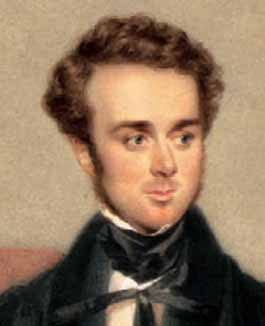Matthew O'Brien (mathematician) facts for kids
Quick facts for kids
Matthew O'Brien
|
|
|---|---|
 |
|
| Born | 1814 |
| Died | 22 August 1855 (aged 41) Petit Ménage, Jersey
|
| Alma mater | Trinity College, Dublin Caius College, Cambridge |
| Scientific career | |
| Fields | Mathematics |
| Institutions | King's College London |
Matthew O'Brien (1814–1855) was a clever Irish mathematician who lived in the 1800s. He made important contributions to how we understand and use vectors in math, even though his ideas were not fully recognized at the time.
Contents
Who Was Matthew O'Brien?
Matthew O'Brien was born in 1814 in Ennis, a town in county Clare, Ireland. His father was a medical doctor. Matthew grew up to become a very talented mathematician.
Early Life and Education
In 1830, Matthew O'Brien began his studies at Trinity College, Dublin. Later, in 1834, he moved to Caius College at the University of Cambridge in England. He worked very hard and graduated in 1838. He was known as the "third wrangler" in his class. A wrangler was a student who achieved top honors in the challenging mathematics exams at Cambridge. This meant he was the third best math student in his graduating year! He was taught by a famous mathematician named William Hopkins. For a short time, from 1840 to 1841, O'Brien was a "fellow" at Caius College. This means he was a researcher and teacher there.
Teaching and Research Career
From 1844 to 1854, Matthew O'Brien worked as a lecturer at King's College London. He taught subjects like Natural Philosophy (which is like science) and Mathematics. At the same time, he also taught Astronomy at the Royal Military Academy, Woolwich. This was a school for training military officers.
His Big Ideas in Mathematics
Matthew O'Brien wrote twenty math papers and several textbooks for students. His most important work was about something called the "vector method." He published these ideas in a series of papers between 1846 and 1852.
What is the Vector Method?
The vector method is a way to describe things that have both a size and a direction, like how fast something is moving and in what direction. Think of an arrow: its length shows the size, and where it points shows the direction. This method is super important in physics and engineering today.
Why His Work Was Special
O'Brien's ideas about vectors were very new and creative for his time. However, he wasn't able to fully develop his method. Some parts of his theories needed more work, and he didn't include a key idea called "associativity," which is important for how vectors combine. Because of this, and perhaps because his ideas were so far ahead of his time, other mathematicians didn't pay much attention to his work back then. Sadly, Matthew O'Brien passed away in 1855 at the age of 41.
 | Calvin Brent |
 | Walter T. Bailey |
 | Martha Cassell Thompson |
 | Alberta Jeannette Cassell |

